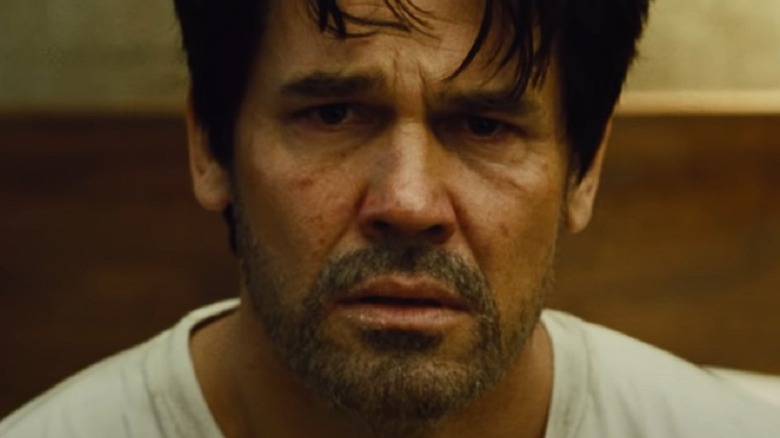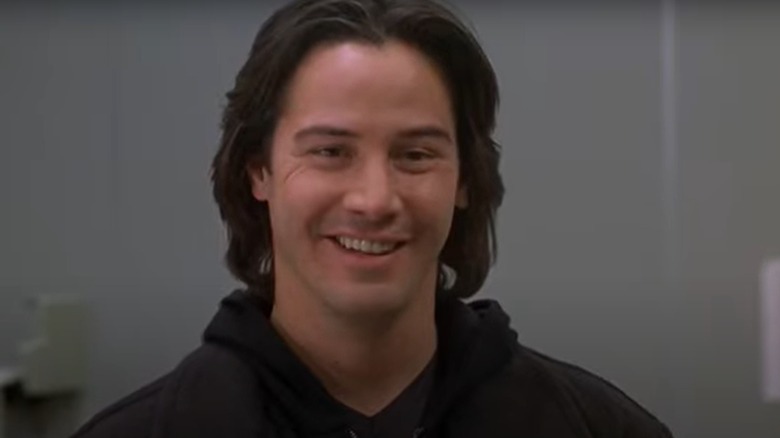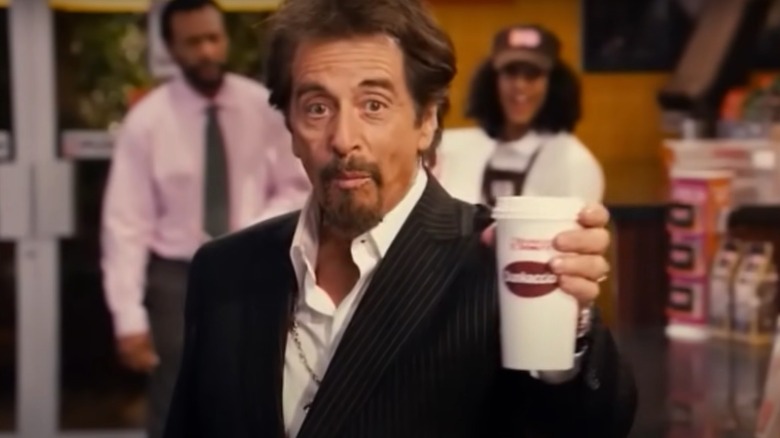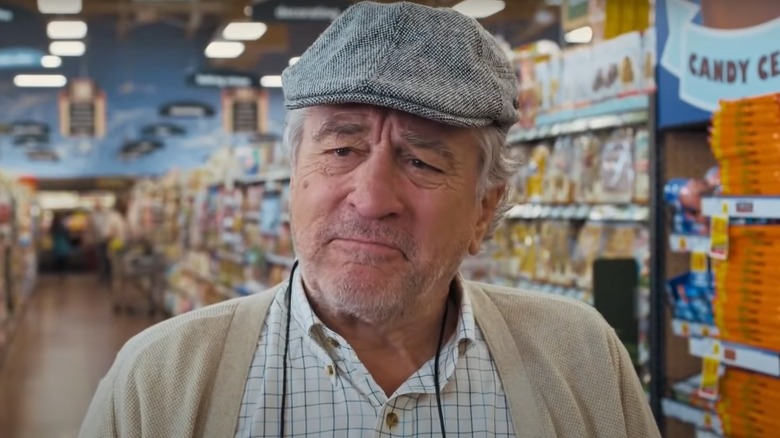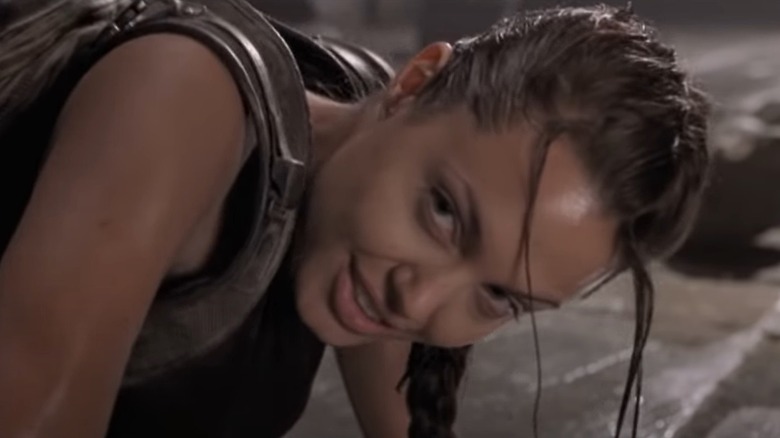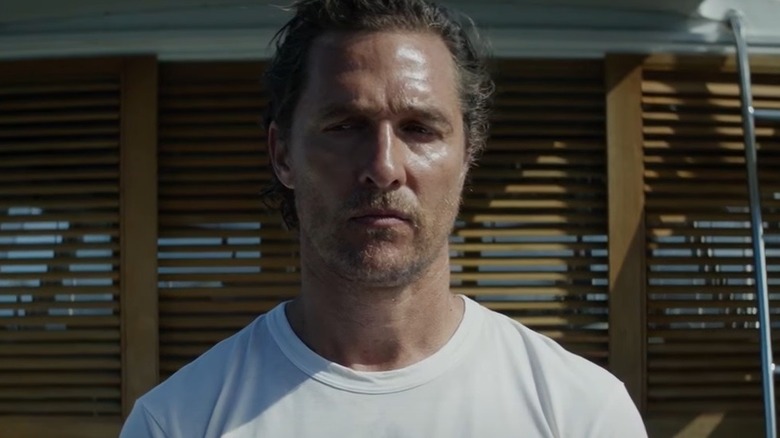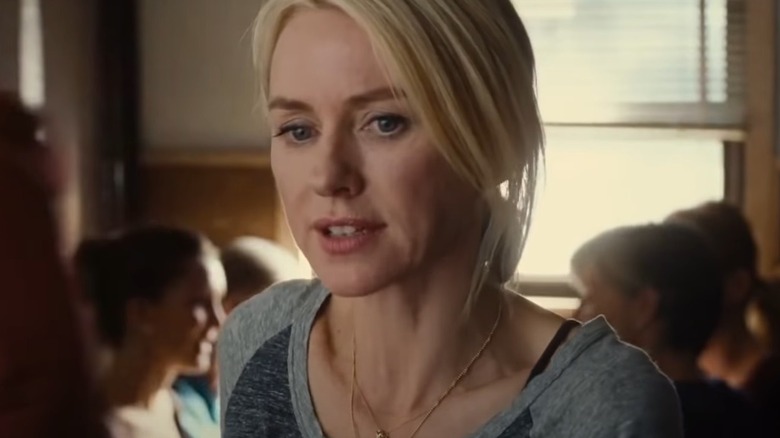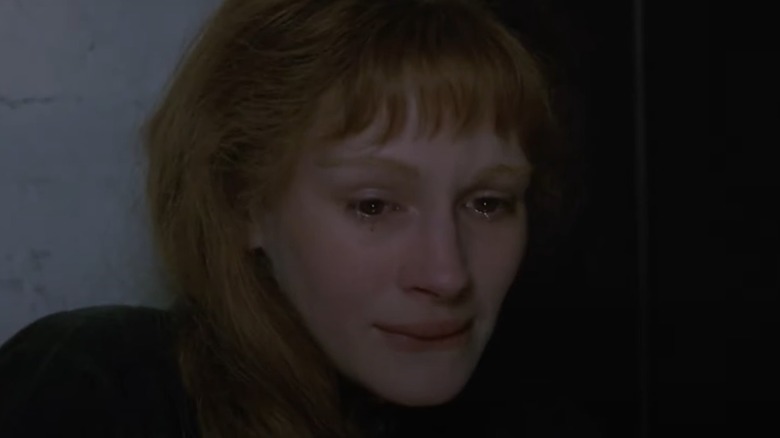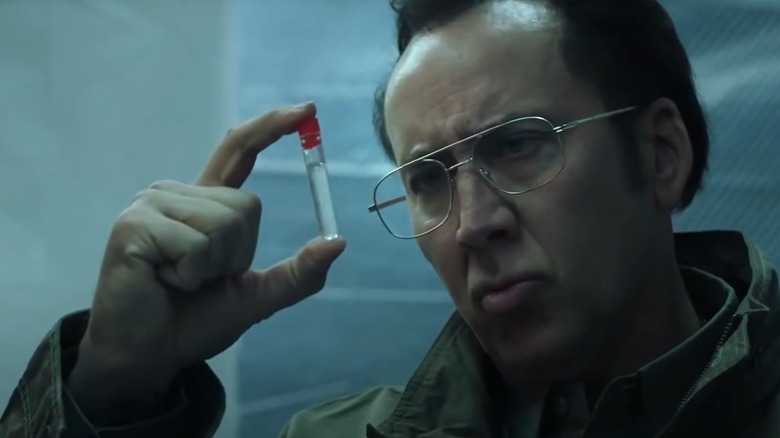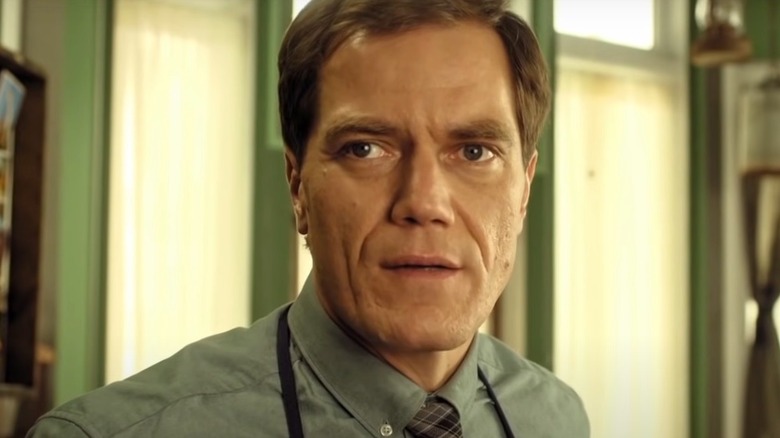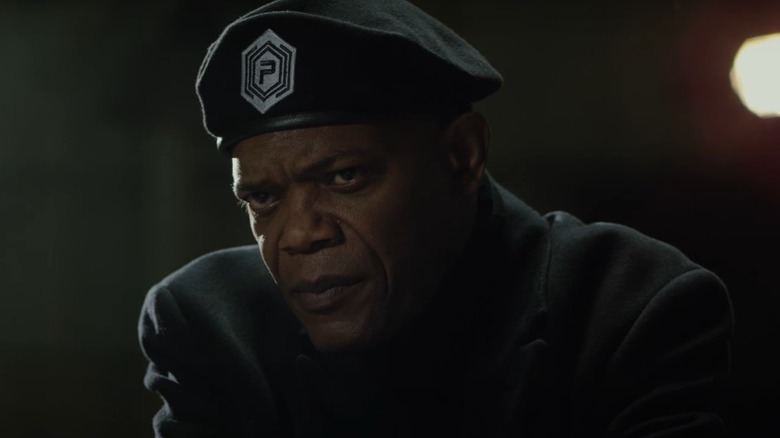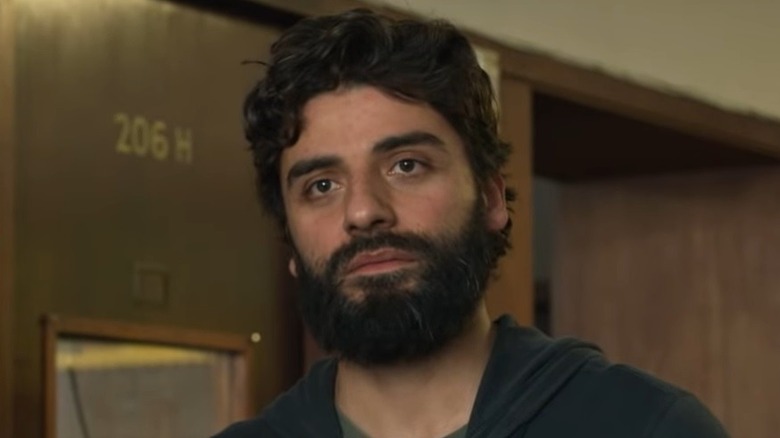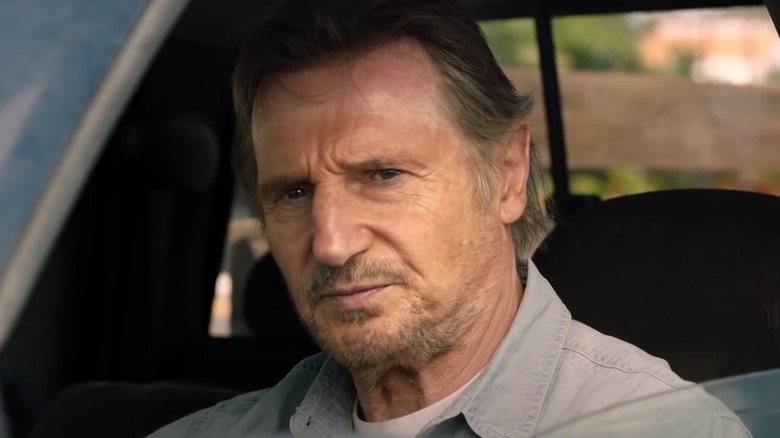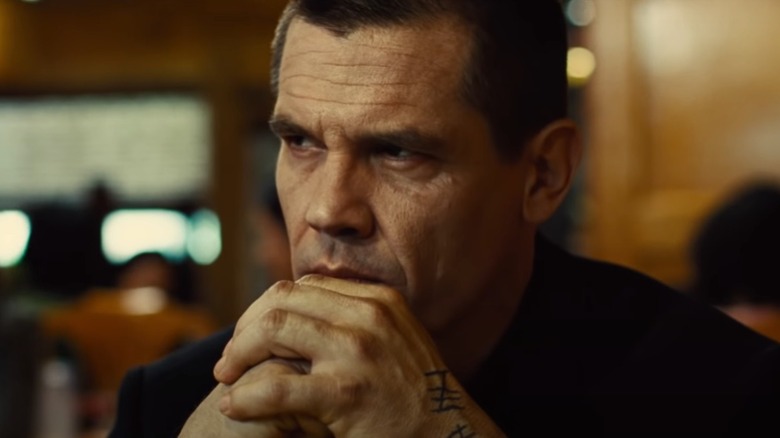Beloved Actors With A Ridiculous Number Of Rotten Movies We've Forgotten About
Nowadays, the simplest way to determine a movie's critical reception is its Rotten Tomatoes score. If a film is given a positive review by at least 60% of the website's registered critics, it's considered "fresh," but if less than 60% like it, it's deemed "rotten." The metric has its flaws — it doesn't account for the critics' opinions beyond the positive-negative binary — but it's a useful shorthand, and seeing a large number of rotten movies in an actor's filmography generally indicates that they might be doing something wrong.
Acting is a job like any other, and even the biggest, most well-known actors aren't above doing films that don't end up working, whether for a paycheck or because they really thought the projects could be good. A few bad movies in an otherwise strong filmography is fine, but too many of them can add up and lead great actors into decline. This is a list of some of the best actors working in Hollywood, all of whom have a surprising number of critical duds to their name. Some have steered their careers back in the right direction, while others seem hopelessly lost.
All Rotten Tomatoes scores are correct at the time of this writing.
Keanu Reeves
Keanu Reeves has been enjoying a career renaissance since starring in the first "John Wick" film. It's easy to forget that for many years he had a reputation for being a bad, limited actor. He's made a large number of subpar projects in his time, with his run of movies leading up to the first "John Wick" being especially dire. He stopped appearing in studio movies altogether after the 2008 remake of "The Day the Earth Stood Still," which scored just 20% on Rotten Tomatoes. Instead, he made several badly-reviewed indies before returning with yet another big budget flop, 2013's "47 Ronin," which only managed 16% on the Tomatometer. "John Wick" came out the following year, saving Reeves from bottoming out.
Many of Reeves' biggest triumphs have been followed by failures. "Speed" cemented him as an action star in 1994, but the four movies that came after it — including the forgettable action flicks "Johnny Mnemonic" and "Chain Reaction," which scored 19% and 18%, respectively — were critical and commercial flops. He recovered with the sensational "The Matrix" in 1999, but then followed that up with another run of five rotten films, among them the Razzie-nominated romantic drama "Sweet November" (15%). The worst of the lot was the 2000 horror movie "The Watcher," which Reeves later said he was tricked into making after a friend forged his signature on the agreement. It scored just 11% on the Tomatometer.
Al Pacino
Al Pacino's status as one of the great screen actors, cemented by classics like "The Godfather" movies and "Dog Day Afternoon," is so untouchable that it can survive any number of bad projects. He actually made some terrible movies in his heyday, including the turgid racecar-driver drama "Bobby Deerfield" in 1977 and the forgotten comedy "Author! Author!" in 1980, which inspired Roger Ebert to ask: "What's Pacino doing in this mess?" After the failure of 1985's "Revolution," which holds an embarrassingly low 10% rating on Rotten Tomatoes today, Pacino took a hiatus from acting, winning his only Oscar soon after returning (he was named best actor for 1992's "Scent of a Woman").
In a 2019 interview with GQ, Pacino admitted that he's far less picky about his projects nowadays. "Sometimes they offer you money to do something that's not adequate, and you talk yourself into it," he said. "You say, 'Oh, no. I'm gonna make this better.'" This explains a terrible run that started in the 2000s, with Pacino giving committed performances in service of mediocre movies. The most infamous example of this is "Jack and Jill," which scored just 3% on Rotten Tomatoes. Pacino was singled out as the sole highlight in the widely-reviled Adam Sandler comedy. He put a similar amount of impressive effort into his one scene in the notorious bomb "Gigli" (6%), and into his lead performances in the forgettable thrillers "Misconduct" (7%), "88 Minutes" (5%), and "Hangman" (4%).
Robert De Niro
Like his occasional screen partner Al Pacino, Robert De Niro has used his status as an icon of '70s cinema to cash paychecks on forgettable projects. While Pacino has mostly made bad thrillers, De Niro has focused his attention on lame comedies. The relative critical success of 1999's "Analyze This" and 2000's "Meet the Parents" (which scored 69% and 84% on Rotten Tomatoes, respectively) led to De Niro starring in badly-reviewed sequels of both. He spent the '00s making movies like "Shark Tale" (35%), the forgotten Eddie Murphy vehicle "Showtime" (25%), and "The Adventures of Rocky and Bullwinkle" (43%).
De Niro's ability to pick projects got even worse as he entered the 2010s, leading to yet more awful comedies like "New Year's Eve" and "The Big Wedding," both of which scored a measly 7% on Rotten Tomatoes. Believe it or not, they're not even his worst-reviewed movies — De Niro has two films rated at just 4%, the dreadful drama "The Bridge of San Luis Rey" and the awful horror flick "Godsend." There's been the occasional promise of a comeback, particularly with De Niro's Oscar-nominated performance in "Silver Linings Playbook," but he's continued to choose poorly even after getting rave reviews for Martin Scorsese's "The Irishman" in 2019. The following year, he appeared in yet another cringe-worthy comedy, the family film "The War with Grandpa." It scored a generous 29% on the Tomatometer.
Angelina Jolie
Many of the actors on this list have gone through rough patches but have numerous acclaimed works to balance that out. The same cannot be said for Angelina Jolie, who became one of the most famous and bankable stars of the 21st century while rarely working on movies that got better than mediocre reviews. Even the film she won the Oscar for best supporting actress for, 1999's "Girl, Interrupted," sits at 53% on Rotten Tomatoes. After "Girl, Interrupted," Jolie made ten rotten movies in a row, including both "Tomb Raider" adaptations, which scored just 20% and 24% on the Tomatometer, respectively. The worst of the bunch was the flat thriller "Original Sin," which, with a score of just 12%, is Jolie's worst-reviewed film to date.
Jolie has had some critical successes, including the "Kung Fu Panda" films and the HBO film "Gia," but, generally, even the Jolie movies that avoided rotten status barely did so. "Mr. & Mrs. Smith," one of Jolie's biggest hits, has a 60% approval rating, and "Changeling," for which Jolie received an Oscar nomination, also squeaked by with a score of 62%. One of the few shows of wide-scale critical support for Jolie was for her fourth directorial effort, "First They Killed My Father," which received an 88% rating. Her other three movies as director, "In the Land of Blood and Honey," "Unbroken," and "By the Sea," are all considered rotten.
Matthew McConaughey
Matthew McConaughey's run of acclaimed performances and projects spanning from 2011 to 2014, dubbed "The McConaissance" by the press, came after a string of poorly-reviewed romantic comedies. Rather than push himself as an actor, McConaughey coasted off his natural charm and good looks in movies like "Fool's Gold" (11%), "The Wedding Planner" (17%), and "Failure to Launch" (23%). This laidback approach reached its low point with 2008's "Surfer, Dude," the rare recipient of a 0% Rotten Tomatoes score. It would take "The Lincoln Lawyer" in 2011 for McConaughey to begin recovering his credibility.
The McConaissance peaked in 2014 when McConaughey won his Oscar for "Dallas Buyers Club" and starred in "Interstellar." After that, he backslid into another run of poorly-chosen projects. McConaughey went on to star in several failed prestige films, including the unsuccessful true-story dramas "Free State of Jones" (47%) and "Gold" (42%). The biggest failure of this period was "The Sea of Trees," the Gus Van Sant-directed drama that bombed hard at Cannes and scored just 17% on the Tomatometer.
Perhaps the most bizarre movie of the post-McConaissance era is 2019's "Serenity," a film so bad that the distributor actually gave up on promoting it. "Regardless of the spend, it's next to impossible for an adult-skewing drama to overcome a 23% score on Rotten Tomatoes," Aviron Pictures said in a statement (via Deadline). "To have spent more would have been irresponsible to our capital partners and wouldn't have made prudent business sense for an independent distributor."
Naomi Watts
British actor Naomi Watts broke through internationally in 2001 when she starred in David Lynch's "Mulholland Drive," critically regarded as one of the greatest films of the 21st century. She followed it with the lead role in the hit horror movie "The Ring" and an Oscar-nominated performance in "21 Grams," but soon her track record became spotty, defined as much by failure as by success.
Highly anticipated sequel "The Ring Two" was roundly rejected by critics, scoring just 20% on Rotten Tomatoes, and the psychological thriller "Stay" didn't fare much better, with a rating of 27%. The success of films like "King Kong," "Eastern Promises," "The Impossible," and "Birdman" kept her on the A-list, but Watts' luck worsened as she entered the 2010s, starring in a string of duds. Her Princess Diana biopic "Diana" was torn to shreds by the critics, scoring just 7% on the Tomatometer. Even that wasn't as bad as the forgettable thriller "Dream House," which landed a 6% rating, and the horror flick "Shut In," which only managed 5%.
Watts went on to star in the incoherent and ill-judged "The Book of Henry" (22%), and she was one of many great actors wasted in the "Divergent" series. She hasn't returned to tentpole projects since then, instead focusing on barely-released films like "The Wolf Hour" (48%), "This Is the Night" (13%), and "The Desperate Hour" (30%). Her last big success was the 2019 social thriller "Luce," which is Certified Fresh with a score of 90%.
Julia Roberts
Julia Roberts had only been working in Hollywood for a few years when she suddenly became one of the biggest movie stars in the world. The one-two punch of "Steel Magnolias" in 1989 and "Pretty Woman" in 1990 made her an icon of romantic comedies, but rather than repeat herself, she followed those films with several attempts at different genres, almost all of which got bad reviews. Some of these experiments were successful financially even if the critics didn't like them, such as Steven Spielberg's Peter Pan movie "Hook," but others bombed both critically and commercially. The biggest disasters of the lot were "Mary Reilly," a Jekyll-and-Hyde story that only made $5.7 million in the U.S., and "I Love Trouble," a crime-comedy that flopped on the back of reports that Roberts and co-star Nick Nolte hated each other. They hold 26% and 22% ratings on Rotten Tomatoes, respectively.
After Roberts' Oscar win for "Erin Brockovich," she mostly stayed within her niche of light comedies and was rewarded with generally decent reviews. She remained a reliable box office draw going into the 2010s, but the projects she chose got worse and worse reviews, with her two Garry Marshall-directed holiday movies, "Valentine's Day" and "Mother's Day," scoring just 18% and 8% on the Tomatometer. Looking to freshen things up, she returned to the thriller genre for the first time since the 90s, getting lukewarm reviews for 2015's "Secret in Their Eyes" (39%) and 2016's "Money Monster" (59%).
Nicolas Cage
One of the appeals of Nicolas Cage is that he gives intense and memorable performances whether he's in a good movie or a bad one. But an actor being the best thing about a bad movie still means they've made a bad movie, and Cage has made more bad movies than most other well-known actors ever will. He was well-reviewed for much of his early career, with occasional duds like 1990's "Fire Birds" (which now sits at 10% on Rotten Tomatoes) being somewhat rare. As the '90s rolled on, the stinkers became more common. The lowest of the many low points was the disastrous thriller "Deadfall," the first of his films to score 0% on Rotten Tomatoes (2014's "Left Behind" and 2019's "Grand Isle" also have big fat zeros).
Cage went into a downward spiral following the widely-mocked 2006 remake of "The Wicker Man," which scored a generous 15% on Rotten Tomatoes. He was soon reduced to churning out direct-to-video action movies, blandly-titled and blandly-made pictures like "Running with the Devil," "Kill Chain," and "Looking Glass." They were all deemed rotten, typically landing in the 10-20% range. The Oscar winner (he was named best actor for "Leaving Las Vegas" back in the mid-90s) has mounted an unexpected comeback in recent years, scoring rave reviews for his performances in "Mandy," "Color Out of Space," and "Pig." The latter film was expected to scoop a few Oscar nominations, but it got snubbed by the Academy.
Michael Shannon
Before his first Oscar nomination for "Revolutionary Road" in 2009, Michael Shannon had worked consistently as a character actor, taking small but memorable roles in good and bad movies alike. He became a favorite of producer Jerry Bruckheimer in his early days, proving to be a bright spark in the otherwise terrible films "Pearl Harbor" (his big screen debut) and "Kangaroo Jack." The latter, an Australia-set comedy starring Jerry O'Connell, scored a damning 8% on Rotten Tomatoes, and rightfully so. Believe it or not, this isn't the worst film that Shannon has been in — his sophomore picture, the 2001 drama "New Port South," is a member of the dreaded 0% club.
"Revolutionary Road" put him on the Academy's radar, and he was back in the limelight when he received a second Oscar nod for "Nocturnal Animals" in 2017, but Shannon is perhaps best known for his turn as General Zod in the DC films "Man of Steel" and "Batman v Superman: Dawn of Justice." He played the part admirably, but both pictures were deemed rotten, earning scores of 56% and 29%, respectively. There's no doubting his talent (see: "Knives Out" and "The Shape of Water"), but Shannon is definitely an actor with a surprising amount of duds on his resume. Other terrible outings include the unfunny comedy "Let's Go to Prison" (13%), the disappointing DC flick "Jonah Hex" (12%), the woeful actioner "13" (8%), and the bizarre Bigfoot movie "Pottersville," another zero-percenter.
Samuel L. Jackson
Over his four decades as a working actor, Samuel L. Jackson has appeared in more than 150 films. When an actor works that frequently, they're bound to make some bad movies from time to time, and Jackson has definitely made his fair share of stinkers. He's also made so many classics that his worst work gets balanced out. There's really no pattern to Jackson's lulls — his middling movies are evenly spread across his long career, just as likely to follow his acclaimed projects as his biggest flops.
He's only ever had one concentrated period of rotten movies: 2008 was a terrible year for him, dominated by forgotten bombs like "Jumper" (15%), "The Spirit" (14%), and "Gospel Hill" (33%). Otherwise, his bad movies usually coexist with his good ones. He followed up his breakout role as a drug addict in Spike Lee's hit "Jungle Fever" with the weak comedy "Strictly Business" (10%). He popped up in the woeful Hailee Steinfeld action-comedy "Barely Lethal" (26%) the same year as his acclaimed performances in "Chi-raq" and "The Hateful Eight."
You just never know what you're going to get with Jackson, who has more than a dozen movies rated below 20% on the Tomatometer, many of them in the single figure range. The worst of the bunch, as far as the critics are concerned, is the 2014 thriller "Kite," which scored 0% on the review aggregation website.
Oscar Isaac
Oscar Isaac announced himself as a major talent in the Coen brothers movie "Inside Llewyn Davis," playing the titular musician with aplomb. Prior to that, he toiled away as a supporting actor. His biggest early role was as the villain in the poorly-received Russell Crowe-Ridley Scott blockbuster "Robin Hood," which scored 43% on Rotten Tomatoes. Despite the rotten score, that was actually one of his best-reviewed movies of the time. Isaac was in the likes of Zack Snyder's "Sucker Punch" (22%), the historical drama "For Greater Glory" (20%), and Madonna's directorial debut "W.E." (12%, his lowest-scoring film to date).
"Inside Llewyn Davis" started a golden period for Isaac, who appeared in a string of Certified Fresh films. He had four hits in a row ("The Two Faces of January," "Ex Machina," "A Most Violent Year," and "Star Wars: The Force Awakens"), but a slump was to follow. The thriller "Mojave" registered a low rating of 20%, Marvel movie "X-Men: Apocalypse" (in which he played the titular villain) only managed 46%, the George Clooney-directed "Suburbicon" scored 28%, and the romance flick "Life Itself" was deemed a real downer, with only 13% of critics approving.
More recently, Isaac provided the voice of Gomez Addams in the animated film "The Addams Family" and its sequel, both of which failed to impress the critics. Fortunately for him, his Disney+ series "Moon Knight" has been hailed as one of the most exciting Marvel projects to date.
Liam Neeson
Oscar nominee ("Schindler's List") Liam Neeson was a beloved, serious actor until 2008, when his performance in the hit thriller "Taken" made him an action star in his mid-50s. Following the success of "Taken," he signed up for many other similar action movies. Some, like "The Grey" and "A Walk Among the Tombstones," got decent reviews, but most didn't. Neeson was no stranger to appearing in disliked movies, having starred in both "Star Wars: The Phantom Menace" and the remake of "The Haunting" in 1999, but those used to be outliers in an otherwise dignified career.
In the 2010s, Neeson's action movie failures started to define him. He became known for the likes of the "Taken" sequels (which scored 22% and 13% on Rotten Tomatoes, respectively), "Battleship" (34%), both "Clash of the Titans" movies (27% and 26%), and "The A-Team" (49%). Only his occasional collaborations with great directors, including Martin Scorsese ("Silence") and Steve McQueen ("Widows"), showed that he could still be taken seriously as an actor.
In recent years, Neeson has been in rotten film after rotten film. He played a major role in the belated sequel "Men in Black: International" in 2019 (23%), and he's fronted forgettable action movies with generic titles like "Honest Thief" (39%), "The Marksman" (39%), and "The Ice Road" (43%). 2022's "Backlight" can also be added to that list. "Turn it off," reads the Rotten Tomatoes critics consensus.
Josh Brolin
Josh Brolin had been working for more than two decades when he starred in the Coen brothers hit "No Country for Old Men" in 2007. That project marked a comeback for the actor, who had gotten himself stuck in a rut. The "Goonies" alum almost broke through in 1996 with his part in the acclaimed comedy "Flirting with Disaster," but he followed that with a series of supporting roles in quickly forgotten duds. 2000's "Hollow Man" made money but didn't impress the critics (it holds a score of 26% on Rotten Tomatoes). His other projects of the time were equally dismissed and didn't do well at the box office, like the Paul Walker-Jessica Alba thriller "Into the Blue" and the 1999 reboot of the '60s TV show "The Mod Squad," which has a damning 3% on the Tomatometer.
After "No Country for Old Men" and his Oscar nomination for "Milk" the following year, Brolin got much better at picking his projects, though even then he didn't always choose wisely. He popped up in the dire dramedy "Women in Trouble" (29%) in 2009, and the following year, he played the eponymous character in the DC flop "Jonah Hex" (12%). 2013 was the actor's worst year on record, with three flops back to back: The misguided crime thriller "Gangster Squad" (31%), Spike Lee's underwhelming "Oldboy" remake (39%), and the romance flick "Labor Day" (35%).
